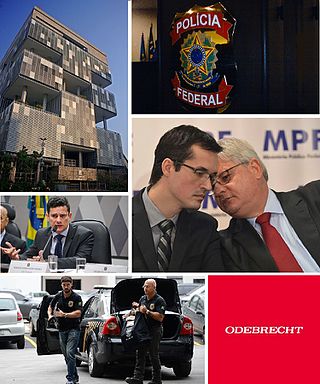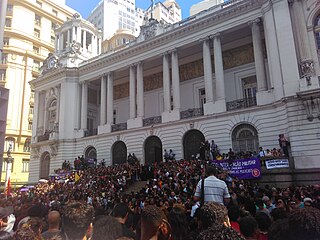
Corruption in Brazil exists on all levels of society from the top echelons of political power to the smallest municipalities. Operation Car Wash showed central government members using the prerogatives of their public office for rent-seeking activities, ranging from political support to siphoning funds from state-owned corporation for personal gain. The Mensalão scandal for example used taxpayer funds to pay monthly allowances to members of congress from other political parties in return for their support and votes in congress. Politicians also used the state-owned and state-run oil company Petrobras to raise hundreds of millions of reais for political campaigns and personal enrichment.

Operation Car Wash was a landmark anti-corruption probe in Brazil. Beginning in March 2014 as the investigation of a small car wash in Brasília over money laundering, the proceedings uncovered a massive corruption scheme in the Brazilian federal government, particularly in state-owned enterprises. The probe was conducted through a joint task force of agents in the federal police, revenue collection agency, internal audit office and antitrust regulator. Evidence was collected and presented to the court system by a team of federal prosecutors led by Deltan Dallagnol, while the judge in charge of the operation was Sergio Moro. Eventually, other federal prosecutors and judges would go on to oversee related cases under their jurisdictions in various Brazilian states. The operation implicated leading businessmen, federal congressmen, senators, state governors, federal government ministers, and former presidents Collor, Temer and Lula. Companies and individuals accused of involvement have agreed to pay 25 billion reais in fines and restitution of embezzled public funds.

Sergio Fernando Moro is a Brazilian jurist, former federal judge, college professor, and politician. He was elected as a member of the Federal Senate for Paraná in October 2022. In 2015, he gained national attention as one of the lead judges in Operation Car Wash, a criminal investigation into a high-profile corruption and bribery scandal involving government officials and business executives. Moro was also Minister of Justice and Public Security under the presidency of Jair Bolsonaro from 2019 to 2020.

On 6 September 2018, then federal deputy Jair Bolsonaro suffered an attack during a rally promoting his election campaign for the presidency of Brazil. While being carried through a crowd of supporters, Bolsonaro suffered a knife wound to the abdomen from Adélio Bispo de Oliveira.

Augusto Heleno Ribeiro Pereira is a Brazilian politician retired general of the Brazilian Army. He was military commander of the Amazon and Chief of the Department of Science and Technology of the Army. Heleno has declared positions against official politics, particularly about the attitude of the international community in regards to Haiti and the indigenous politics of the Brazilian government.

The assassination of Marielle Franco and Anderson Gomes took place on March 14, 2018, in Estácio, Rio de Janeiro, Brazil. The assassins were in a car that pulled up alongside the Rio de Janeiro councilwoman's car and fired several shots, which also killed the driver. An investigation conducted by the authorities pointed to political motivations.

Events in the year 2020 in Brazil.

André Luiz de Almeida Mendonça is a Brazilian attorney, Presbyterian pastor, and politician currently serving as Justice of the Supreme Federal Court. He is the third evangelical Christian positioned to join the top court, and former Minister of Justice and Public Security and Attorney General of the Union in the administration of President Jair Bolsonaro. Prior to assuming this role, he served as Attorney General of Brazil in the same administration.

Alexandre Ramagem Rodrigues is a Brazilian politician and federal police officer. He served under President Jair Bolsonaro as Director of the Brazilian Intelligence Agency from 2019 until 2022. Ramagem was elected to the Chamber of Deputies representing Rio de Janeiro in the 2022 election.
The 2020 Brazilian protests and demonstrations were popular demonstrations that took place in several regions of Brazil, in the context of the COVID-19 pandemic in Brazil. The protests began on 15 March 2020, with demonstrations in support of President Jair Bolsonaro, the target of several investigations, and against the isolation measures imposed by state governments.

The 2021 Brazilian protests were popular demonstrations that took place in different regions of Brazil in the context of the COVID-19 pandemic. Protests both supporting and opposing the government happened.

The Case Covaxin, also known as Covaxgate, refers to an investigation made by the Brazilian Federal Public Ministry (MPF), held on 16 June 2021, which found evidence of irregularities in the purchase of 20 million doses by the Ministry of Health of the Indian vaccine Covaxin, with the value of the vaccines 1000% higher than initially foreseen.

The Vila Cruzeiro shootout took place on 24 May 2022 in the favela of the same name in Rio de Janeiro, during a joint operation by the Special Police Operations Battalion (BOPE), the Federal Police and the Federal Highway Police that resulted in at least 26 people killed by gunshots or cutting objects. It was the second most lethal police operation in the city of Rio de Janeiro, second only to the Chacina do Jacarezinho, which occurred a year earlier.

On 5 June 2022, Brazilian indigenist Bruno Pereira and British journalist Dom Phillips were murdered during a boat trip through the Vale do Javari, the second-largest indigenous area in Brazil.
The Celso Daniel Case refers to the events surrounding the death of Celso Daniel, then mayor of Santo André for the Workers' Party, on January 18, 2002.
Port Investigation refers to a police inquiry under the responsibility of the Federal Police of Brazil that investigates the alleged favoritism of companies connected to the port sector by a decree signed by President Michel Temer, which extended concession contracts at the Port of Santos. The company Rodrimar was said to be the main beneficiary of the decree issued by Temer, which, according to investigators, was edited in exchange for bribes to the president and his main allies. For the first time in the country's history, a sitting president has had their bank records broken as a result of an investigation. In addition, the investigation led to Operation Skala, which temporarily arrested allies and friends of the president, as well as businessmen from the port sector. The case is being handled by Luís Roberto Barroso, a justice of the Supreme Federal Court. The inquiry was concluded on October 16, 2018, resulting in the indictment of eleven individuals, including Michel Temer and his daughter Maristela, with requests for the seizure and blocking of assets of all the accused and requests for the preventive imprisonment of four of them. The rapporteur forwarded the inquiry to the Attorney General's Office for a response within 15 days.
Pro-Bolsonaro demonstrations on Paulista Avenue on February 25, 2024 were a political act convened by former President Jair Bolsonaro (PL) amid investigations by the Federal Police (PF) about an alleged coup plot involving the former Mandanker and High military command. The declared objective of the event was to defend "the Democratic Rule of Law and Freedom" and counter the accusations against Bolsonaro.
Paulo Roberto Franco Marinho is a Brazilian businessman, executive and politician affiliated with the Republicans. He worked in the financial market, in the shipbuilding industry, as a communications executive and became a well-known and influential figure in the society of Rio de Janeiro.
The Operation Counter-coup is an investigation started by the Federal Police of Brazil on 19 November 2024, authorized by the Supreme Federal Court, to investigate crimes related to the 2022 Brazilian coup plot which aimed to prevent the inauguration of Luiz Inácio Lula da Silva and Geraldo Alckmin, president and vice president-elect of Brazil in 2022, respectively. The group under investigation, consisting of Brazilian Army Special Forces personnel and a federal police officer, allegedly planned to carry out assassinations and kidnappings of high-ranking officials using military and terrorist tactics. The operation was authorized by the Supreme Court justice Alexandre de Moraes, who emphasized the "extreme danger" posed by the individuals involved.













